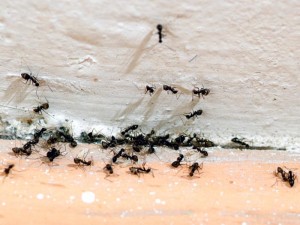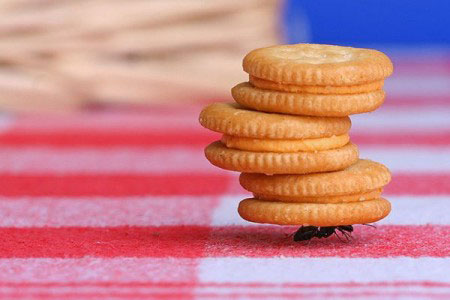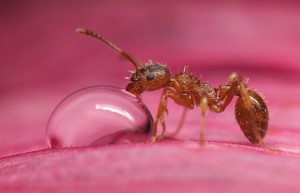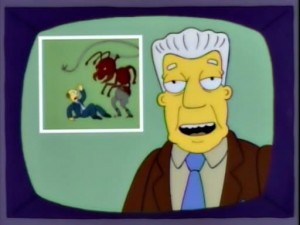How to keep ants from invading your kitchen
February 27th, 2012
 Ants can strike at any time. If the six-legged fiends aren’t already marching two-by-two through your home, then they could very well be planning their next offensive as we speak.
Ants can strike at any time. If the six-legged fiends aren’t already marching two-by-two through your home, then they could very well be planning their next offensive as we speak.
There are many reasons to keep ants out of your kitchen. It’s not a good look for your benchtops and tiles to be moving. The ants can devour the food you were saving for yourself and your loved ones. And, depending on the ants’ means of entry, the insect invaders could spread disease and/or poisonous chemicals throughout your home.
Here are a few ways you can manage an ant invasion and keep your kitchen under control:
Keep ants outside with strong smells
As is the case with many household problems, the best solution for an ant invasion is often prevention.
You can stop an ant problem in the early stages or before it even begins simply by creating conditions that ants won’t want to involve themselves with.
As ants greatly rely on their sense of smell, spreading strong-scented substances across their points of entry will often discourage them from exploring your house.
If the environmental conditions around your house are changed enough, they’ll decide that an invasion is more trouble than it’s worth.
Examples of substances that are unpleasant to ants include, but aren’t limited to:
Lemon juice
Cinnamon
Baking soda
Coffee grounds
Orange peel
Vinegar
Baby/talcum powder
Cloves
Mint
Chalk
You can also use put this plan to work in reverse, and place some substances that smell more attractive to ants (sugar water, honey etc.) some distance outside your house as a distraction – they may get so excited by this treat that they’ll forget all about your house.
Keep things clean
The price of freedom from ants is eternal vigilance. Keep a tidy house, and ants will have no need to return.
Food is a major motivator for ants, so always clean and put away plates (a dishwasher can make this simpler), take out the garbage, store food in airtight containers, and keep your kitchen surfaces wiped down – an electric or induction cooktop makes it much easier to keep the hardworking surface of your kitchen clean.
The outside of your house should also be kept fairly clean if possible. Try and remove any adjacent plant matter that ants may live in, feed on, or use as a point of entry.
If you do manage to kill any ants (or other insect invaders such as cockroaches), don’t leave the bodies on display as a gruesome warning to the others – sooner or later, the ants will just consider it more food, and be even more encouraged to come and visit.
If you’ve any foods that need to be left out in the open (pet food, for example), one trick for keeping ants away is to float the container in a bowl of water, forming a moat. Though the water being left out in the open can lead to problems of its own…
Keep things dry
Sometimes ants conduct home invasions in search of water. Depending on the exact species, ants may drink water or they may simply absorb humidity through their skin.
In dry climates, you will often find ants collecting water droplets from household pipes and other pooled water sources for the colony.
To discourage visits from thirsty ants, keep your pipes in good repair and if possible, try to avoid leaving water out.
Keep things sealed
When conditions are rough outside and ants discover that everything they could ever want is inside, they may decide to move in permanently and become your new housemates, whether you want them or not. But an ant occuption can’t succeed if they can’t get into your house.
Making sure that your house is completely sealed off from tiny explorers will keep your kitchen safe. Keep your doors and windows tightly shut and insert filler into any cracks you find being used as convenient entry points.
Sometimes ants have been found inside household appliances such as the fridge, freezer or microwave, so make sure your appliances have good seals in place, and are kept clean and in a good condition.
If ants have moved into your house, establishing a nest in your wall spaces, foundation cracks or the backs of your cupboards, it may be time to get the pest controllers in. Speaking of which…
Going on the offensive
When it comes to dealing with ants, the techniques we’ve listed above are relatively simple preventative solutions and deterrents, as while ants can be extremely frustrating to deal with, exterminating them isn’t always the simplest, wisest or easiest solution. Ants do play an important role in the natural ecosystem, after all: They aid in decomposition, help aerate soil, improve root development and aid in pollination.
But if none of the methods covered above are working, it may be time to call in the big guns.
There are a multitude of different commercially available chemical products to either discourage ants from approaching your house, or to exterminate them, either instantaneously on contact, or slowly, so that they can share the poison with the whole nest. Always follow the instructions on any chemicals you use, and be careful where you place anything that could be toxic – you don’t want Fido, Puss, or Junior playing with it.
The old trick of pouring boiling water down an ant nest? Not always effective, and sometimes dangerous. Ant nests can be extremely deep (see below), and if you don’t manage to kill the Queen, they’ll just come back next season.
Whats’s more, the boiling water can hurt the roots of nearby plants, or splash and scald you if mishandled, and ants whose nests are disturbed will sometimes try to defend the colony – be prepared for a biting counterattack.
Your most reliable option for getting rid of an entire troublesome nest is probably to call an exterminator. Even then, you should be ready to start practicing the preventative techniques described above in case more ants ever return, or else you’ll need to go through the whole process again.
Or, you could always encourage one of these to move in…
Got any secret tips for handling ants? Found another common household substance that ants really hate? Let us know!








Leave a Reply